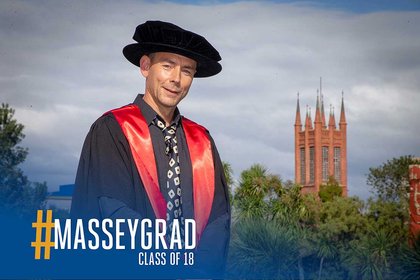
Dr Axel Malecki, who investigated Chile's diaspora for his Development Studies Phd.
Emigrants in search of new opportunities are seen as valuable contributors of new ideas and knowledge to their homeland – but seeking diaspora input for economic development can have unexpected effects, as Dr Axel Malecki's doctoral research reveals.
Dr Malecki, who teaches in Massey’s Bachelor of Arts programme at the Manawatū campus, investigated the political repercussions for a Chilean organisation – ChileGlobal – designed to tap into that nation’s diaspora (a scattered population whose origin lies in a separate geographic locale) in Europe, the United States and United Kingdom. He graduated in the College of Humanities and Social Sciences ceremony today.
In his Development Studies thesis: Repoliticising Development: The Diaspora Knowledge Network (DKN) ChileGlobal and its contribution to development in Chile, he examined diaspora strategies that “tend to represent diasporic communities as development actors whose entrepreneurial expertise, business knowledge and access to resources can be usefully captured via social and monetary remittances.”
While there has been a ‘rise of the diaspora’ as a development tool, Dr Malecki’s study focused on concerns about a trend towards de-politicising diaspora knowledge through state control. In the case of ChileGlobal, diaspora participants resisted the strictly business framework they were recruited for, instead raising their concerns about the Chilean government’s increasing moves to tailor and commodify tertiary education to meet narrow business and economic needs.
Among his findings were that some Chileans “felt reluctant to work with an organisation that was publicly funded, and as such, seen as connected to the state. The volatility then, had quite an impact on the level of engagement and the trust overseas Chileans – particularly those that left under Pinochet [Chilean dictator Augusto Pinochet] – placed in an organisation that was purportedly designed for them.”
Their response, however, helped to generate debate and amplified protests at home to voice discontent at an increasingly market-led direction in Chile’s tertiary courses – and what they saw as the risks to a diverse, robust education system.
Dr Malecki, who moved to New Zealand from Germany 12 years ago, says his thesis sought to find out more about how ideas around engaging with diaspora were playing out in South America, where comparably little research on the topic has been done.
He says new thinking about the role of diaspora in economic development sprung from a 1999 World Development Report by the World Bank that has informed the decision of various countries to implement diaspora strategies for the purpose of generating the transfer of knowledge and expertise from their overseas populations. The report’s oft-cited statement simplistically said; “Knowledge is like light. Weightless and intangible, it can easily travel the world, enlightening the lives of people everywhere. Yet billions still live in the darkness of poverty - unnecessarily.”
Diaspora/development nexus a topical issue for 21st century
The dynamism and fluidity of the global workforce across borders in the 21st century means it is one of the most exciting times to study questions relating to population movement, he says.
“Geographically speaking, Chile has often been at the forefront of tectonic changes in the context of pursuing national development objectives and is often presented as the posterboy/girl for ‘successful’ neoliberal restructuring of its national economy. There is evidence, that policy changes that were instituted in Chile were replicated not only throughout other parts of South America, but also in other geographical regions such as African countries and South East Asia.
“Indeed, the very organisation I was studying has been replicated throughout the region, which, perhaps renders this thesis a window into what might happen in other countries.”
His research also has implications for New Zealand approaches to engaging with the Kiwi diaspora, which is one of the highest in proportion to its homegrown population, he says.
For his research, Dr Malecki travelled to Chile to conduct fieldwork research for three months in 2011 and another three months in 2013 to talk to representatives from migrant organisations “and to get a better understanding of the different public and private institutions pertaining to Chile's expats.”
He also interviewed Chileans living in the United Kingdom and Germany, with participants from a range of backgrounds including CEOs, students and entrepreneurs to academics and public officials. He was invited to join an online platform for ChileGlobal, which he says; “allowed for a richer understanding of the diaspora network.”